特惠-26考研冲刺
特惠-27考研课
双证-在职硕士
免联考-同等学力
26考研-肖八笔记
26考研-时政刷题
26考研-作文押题
26考研-全套真题
26考研-提前估分
保研-路线图
27考研-智能择校
27考研-英语测评
27考研-新大纲对比
热门-计算机择校

扫码加入训练营
牢记核心词
学习得礼盒
真题是非常重要的学习资料,它能更好地帮助我们巩固所学的知识,大家在备考时候要多做一些真题,这样对真题高频考点有所了解,更有目的做好备战,新东方在线考研小编整理了“河北工程大学2024考研真题:翻译硕士英语211”,希望对考生能有帮助。
河北工程大学2024考研真题:翻译硕士英语211
Part I READING ( 40 points, 2 points for each item)
Directions: There are 4 passages in this section. Each passage is followed by some
questions or unfinished statements. For each of them there are four choices marked A), B), C) and D). You should decide on the best choice and mark the corresponding letter
on Answer Sheet. PASSAGE 1 Questions 1 to 5 are based on the following passage. According to the majority of Americans, women are every bit as capable of being good
political leaders as men. The same can be said of their ability to dominate the corporate
boardroom. And according to a new Pew Research Center survey on women and leadership, most Americans find women indistinguishable from men on key leadership traits such as
intelligence and capacity for innovation, with many saying they're stronger than men in terms
of being passionate and organized leaders. So why, then, are women in short supply at the top of government and business in the
United States? According to the public, at least, it's not that they lack toughness, management
talent or proper skill sets. It’s also not all about work-life balance. Although economic research and previous
survey findings have shown that career interruptions related to motherhood may make it
harder for women to advance in their careers and compete for top executive jobs, relatively
few adults in the recent survey point to this as a key barrier for women seeking leadership
roles. Only about one-in-five say women's family responsibilities are a major reason why
there aren't more females in top leadership positions in business and politics. Instead, topping the list of reasons, about four-in-ten Americans point to a double
standard for women seeking to climb to the highest levels of either politics or business, where
they have to do more than their male counterparts to prove themselves. Similar shares say the
electorate (选民)and corporate America are just not ready to put more women in top
leadership positions. As a result, the public is divided about whether the imbalance in corporate America will
change in the foreseeable future, even though women have made major advances in the
workplace. While 53% believe men will continue to hold more top executive positions in
business in the future, 44% say it's only a matter of time before as many women are in top
executive positions as men. Americans are less doubtful when it comes to politics: 73% expect
to see a female president in their lifetime. 1. What do most Americans think of women leaders according to a new Pew Research Center
survey?
A. They have to do more to distinguish themselves. B. They have to strive harder to win their positions. C. They are stronger than men in terms of willpower. D. They are just as intelligent and innovative as men. 2. What do we learn from previous survey findings about women seeking leadership roles?
A. They have unconquerable difficulties on their way to success. B. They are lacking in confidence when competing with men. C. Their failures may have something to do with family duties. D. Relatively few are hindered in their career advancement. 3. What is the primary factor keeping women from taking top leadership positions according
to the recent survey?
A. Personality traits. B. Gender bias. C. Family responsibilities. D. Lack of vacancies. 4. What does the passage say about corporate America in the near future?
A. More and more women will sit in the boardroom. B. Gender imbalance in leadership is likely to change. C. The public is undecided about whether women will make good leaders. D. People have opposing opinions as to whether it will have more women leaders. 5. What do most Americans expect to see soon on America's political stage?
A. A woman in the highest position of government. B. More and more women actively engaged in politics. C. A majority of women voting for a female president. D. As many women in top government positions as men. PASSAGE 2 Questions 6 to 10 are based on the following passage. Officials at the White House announced a new space policy focused on managing the
increasing number of satellites that companies and governments are launching into space. Space Policy Directive-3 lays out general guidelines for the United States to mitigate (缓解)
the effects of space debris and track and manage traffic in space. This policy sets the stage for the Department of Commerce to take over the management
of traffic in space. The department will make sure that newly launched satellites don’t use
radio frequencies that would interfere with existing satellites, and schedule when such new
satellites can be launched. This only applies to American space activities, but the hope is that
it will help standardize a set of norms in the dawning commercial spaceflight industry
throughout the world. Space, especially the space directly around our planet, is getting more crowded as more
governments and companies launch satellites. One impetus for the policy is that companies
are already starting to build massive constellations (星座), comprising hundreds or thousands
of satellites with many moving parts among them. With so much stuff in space, and a limited
area around our planet, the government wants to reduce the chances of a collision. Two or
more satellites slamming into each other could create many more out-of-control bits that
would pose even more hazards to the growing collection of satellites in space. And it’s not like this hasn’t happened before. In 2009 an old Russian craft slammed into
a communications satellite, creating a cloud of hundreds of pieces of debris and putting other
hardware at risk. Journalist Sarah Scoles reports that NASA currently tracks about 24,000
objects in space, and in 2016 the Air Force had to issue 3,995,874 warnings to satellite owners
alerting them to a potential nearby threat from another satellite or bit of debris. That’s why this new policy also includes directions to update the current U.S. Government Orbital Debris Mitigation Standard Practices, which already require any entity
that launches a satellite or spacecraft to vigorously analyze the likelihood that any of their
actions, from an unexpected failure or normal operations, will create more space debris. It
includes accounting for any piece of debris they plan to release over 5mm that might stay in
orbit for 25 years or more. It might seem surprising to think about an item staying in space for
that long, but the oldest satellite still in orbit-Vanguard 1-turned 60 in 2018. Agencies and companies throughout the world are working on developing technology
that would dispose of or capture space debris before it causes serious damage. But for now, the U.S. government is more focused on preventing new debris from forming than taking the
trash out of orbit. 6. What is the purpose of the new U.S. space policy?
A) To lay out general guidelines for space exploration. B) To encourage companies to join in space programs. C) To make the best use of satellites in space. D) To improve traffic conditions in space. 7. What is the Department of Commerce expected to do under the new policy?
A) Reduce debris in space. B) Monitor satellite operations. C) Regulate the launching of new satellites. D) Update satellite communications technology. 8. What does the U.S. government hope to do with the new space policy?
A) Set international standards for the space flight industry. B) Monopolize space industry by developing a set of norms. C) Facilitate commercial space flights throughout the world. D) Promote international collaboration in space exploration. 9. What is a space vehicle launching entity required to do according to the current U.S. Government Orbital Debris Mitigation Standard Practices?
A) Give an estimate of how long its debris will stay in space. B) Account for the debris it has released into space at any time. C) Provide a detailed plan for managing the space debris it creates.
D) Make a thorough analysis of any possible addition to space debris. 10. What are space agencies and companies aiming to do at present?
A) Recycle used space vehicles before they turn into debris. B) Develop technology to address the space debris problem. C) Limit the amount of debris entering space. D) Cooperate closely to retrieve space debris. PASSAGE 3 Questions 11 to 15 are based on the following passage. Professor Stephen Hawking has warned that the creation of powerful artificial
intelligence (AI) will be “either the best, or the worst thing, ever to happen to humanity”, and
praised the creation of an academic institute dedicated to researching the future of intelligence
as “ crucial to the future of our civilization and our species”. Hawking was speaking at the opening of the Leverhulme Centre for the Future of
Intelligence (LCFI) at Cambridge University, a multi-disciplinary institute that will attempt to
tackle some of the open-ended questions raised by the rapid pace of development in AI
research. “We spend a great deal of time studying history,” Hawking said, “which, let’s face it, is mostly the history of stupidity. So it’s a welcome change that people are studying instead
the future of intelligence.” While the world-renowned physicist has often been cautious about AI, raising concerns
that humanity could be the architect of its own destruction if it creates a super-intelligence
with a will of its own, he was also quick to highlight the positives that AI research can bring. “The potential benefits of creating intelligence are huge,” he said. “We cannot predict what we
might achieve when our own minds are amplified by AI. Perhaps with the tools of this new
technological revolution, we will be able to undo some of the damage done to the natural
world by the last one-industrialization. And surely we will aim to finally eradicate disease and
poverty. And every aspect of our lives will be transformed. In short, success in creating AI
could be the biggest event in the history of our civilization.” Huw Price, the center’s academic director and the Bertrand Russell professor of
philosophy at Cambridge University, where Hawking is also an academic, said that the center
came about partially as a result of the university’s Centre for Existential Risk. That institute
examined a wider range of potential problems for humanity, while the LCFI has a narrow
focus.AI pioneer Margaret Boden, professor of cognitive science at the University of Sussex, praised the progress of such discussions. As recently as 2009, she said, the topic wasn’t taken
seriously, even among AI researchers. “AI is hugely exciting,” she said, “but it has limitations, which present grave dangers given uncritical use.” The academic community is not alone in warning about the potential dangers of AI as well as
the potential benefits. A number of pioneers from the technology industry, most famously the
entrepreneur Elon Musk, have also expressed their concerns about the damage that a
super-intelligent AI could do to humanity. 11. What did Stephen Hawking think of artificial intelligence?
A) It would be vital to the progress of human civilization. B) It might be a blessing or a disaster in the making. C) It might present challenges as well as opportunities. D) It would be a significant expansion of human intelligence. 12. What did Hawking say about the creation of the LCFI?
A) It would accelerate the progress of AI research. B) It would mark a step forward in the AI industry. C) It was extremely important to the destiny of humankind. D) It was an achievement of multi-disciplinary collaboration. 13. What did Hawking say was a welcome change in AI research?
A) The shift of research focus from the past to the future. B) The shift of research from theory to implementation. C) The greater emphasis on the negative impact of AI. D) The increasing awareness of mankind’s past stupidity. 14. What concerns did Hawking raise about AI?
A) It may exceed human intelligence sooner or later. B) It may ultimately over-amplify the human mind. C) Super-intelligence may cause its own destruction. D) Super-intelligence may eventually ruin mankind. 15. What do we learn about some entrepreneurs from the technology industry?
A) They are much influenced by the academic community. B) They are most likely to benefit from AI development. C) They share the same concerns about AI as academics. D) They believe they can keep AI under human control. PASSAGE 4 Questions 16 to 20 are based on the following passage. I’ve written this article and you5re reading it. So we are members of the same club. We5re both literate— we can read and write. And we both probably feel that literacy is
essential to our lives. But millions of people all over the world are illiterate. Even in
industrialized Western countries, such as the UK and the USA, approximately 20% of the
population have t4low literacy levels55. But what exactly does that mean?
My parents both left school at 14. They could read and write, but except for a quick look
at the daily newspaper, reading and writing didn’t play a big part in their lives. There were
very few books in the house. My mother was amazed because the woman who lived next door
always wrote a list of what she needed before she went to the supermarket. Why couldn’t she
remember? We laughed about that for weeks. Our family didn5t write lists! And when I was
only 14 years old my father gave me an important letter that he'd written to the bank and
asked me to check it for grammar and spelling mistakes. And there were quite a lot. He never
usually wrote letters or postcards or even Christmas cards. So when he had to write he wasn5t
comfortable or confident. Does that mean that my father had “low level of literacy”?I don’t
think so. There are lots of different definitions of literacy. Some experts define it as having the
reading and writing skills that you need to be independent in your everyday life. So, for
example, if you can read instructions, write a cheque, fill in a form—anything that you need to
do in everyday life—then you are “functionally literate”. Other people say that you are illiterate if you think that you are illiterate. In other words, if you feel that you can read or write as well as you would like to. If you live in a society where most people are literate, then you will feel ashamed or
embarrassed and avoid situations in which you have to read or write. The father of a friend of
mine finally admitted to his family that he couldn't read when he was 45 years old. He bought
the newspaper every day and pretended to read it —and believe it or not, his family had no
idea.We often forget that writing is a recent invention. Many years ago, the word uliterate,5
meant being able to communicate well in speaking, in other words what we now call “articulate”. Story telling was an important activity in the past and still is today in some
societies. Reading was often a co-operative activity —someone would read aloud to a group, often from a religious text such as the Koran or the Bible. Only a hundred years ago, in the United States, you were considered to be literate if you
could sign your name to a piece of paper. It was an important skill. You were not allowed to
vote if you couldn5t sign the voting register, so literacy was connected with political rights, and many people were excluded from the democratic process. Nowadays we see reading and writing as being connected,but that wasn’t so in the past. Many people could read, but not write. Writing was a skilled profession. If you needed
something written then you paid an expert to write it for you. And of course, rich and important people have always employed people to write things
for them. Important company bosses dictated letters to their secretaries or personal assistants. And now with new computer software you can dictate directly to your computer. Being illiterate can have a big effect on people’s lives. For example, a study in the UK
showed that people who write and spell badly are seen as careless, immature and unreliable, and often unintelligent. So it is more difficult for them to find jobs, even when reading and
writing are not necessary for the work. World wide statistics show that literacy problems are associated with poverty and a lack
of political power. More women than men are illiterate. Illiterate people have worse health, bigger families and are more likely to go to prison. So literacy campaigns must be a good
thing. But don’t forget that an illiterate person, or someone with a low level o literacy, isn't
necessarily stupid or ignorant, and may not be unhappy at all. Knowledge and wisdom isn’t
only found in writing. 16. Choose the best expression bellow to replace the underlined part in Para. 4. A) or
B) though
C) like
D) in case
17. Why does the author give two examples in Para.2?
A) To show that literacy is interpreted in different ways. B) To show that Father was more literate than Mother. C) To indicate how important reading and writing are. D) To compare the level of literacy between neighbors. 18. According to the author, the following are some of the defining features of literacy
EXCEPT
A) psychological
B) functional
C) social
D)independent
19. Which of the following statements about reading and writing is CORRECT?
A) Reading and writing have always been regarded as equally difficult. B) People had to read and write well in order to be allowed to vote. C) Reading often requires more immediate interaction than writing. D) Reading and writing have always been viewed as being connected. 20. What do the last two paragraphs mainly focus on?
A) Effects of illiteracy and employment problems. B) Effects of illiteracy and associated problems. C) Effects of illiteracy on one’s personality development. D) Effects of illiteracy on women’s career development. Part II TRANSLATION (30 points)
Directions: For this part, there are two tasks. You are allowed to translate a passage
from Chinese into English and a passage from English into Chinese. You should write
your answer on Answer Sheet. TRANSLATION TASK 1 Translate the following passage into Chinese(15 points). One must recognize the very considerable multiplication of disciplines in the sciences
which by widening the total area of advanced studies has produced an enormous numbers of
specialists whose particular interests are precisely defined. Associated with this is the growth
of specialist periodicals which enable scholars to become aware of what is happening in
different centers of research and to meet each other in conferences. From these meetings come
the personal relationships which are at the bottom of almost schemes of cooperation. But a the
specializations have increased in number and narrowed in range there has been an opposite
movement towards interdisciplinary studies. These owe much to the belief that one cannot
properly investigate the incredibly complex problems thrown up by the modern world and by
the modern world and by recent advantages in our knowledge along the narrow front of a
single discipline. This trend has led to a great deal of academic contact between disciplines
and a far greater emphasis on the pooling of specialist knowledge reflected in the broad
subjects chosen in many international conferences. TRANSLATION TASK 2 Translate the following passage into English(15 points). 在整个发展过程中,我们都要坚持节约优先、保护优先、自然恢复为主的方针,不
能只讲索取不讲投入,不能只讲发展不讲保护,不能只讲利用不讲修复,要像保护眼睛
一样保护生态环境,像对待生命一样对待生态环境,多谋打基础、利长远的善事,多干
保护自然、修复生态的实事,多做治山理水、显山露水的好事,让群众望得见山、看得
见水、记得住乡愁,让自然生态美景永驻人间,还自然以宁静、和谐、美丽。
Part III WRITING (30 points)
Directions:For this part, there are two tasks:
WRITING TASK 1 (10 points)
Please develop the topic into an essay on the ANSWER SHEET with at least 150 words. Brief Reflections on the Use of Translation App. WRITING TASK 2 (20 points)
Please develop the topic into an essay on the ANSWER SHEET with at least 250 words. Should Universities Give Priority to Practical Courses for Students?
以上就是新东方在线小编为各位考研的同学整理的“河北工程大学2024考研真题:翻译硕士英语211”,希望对各位同学有所帮助,希望大家都可以考出好的成绩。
【专业课】资料这里有↑↑↑
本文关键字: 考研真题

 资料下载
资料下载
2014年-2025年考研历年真题汇总
发布时间:2024-04-25扫码添加【考研班主任】
即可领取资料包
考研大纲PDF电子版下载-历年(附解析)
发布时间:2024-04-25扫码添加【考研班主任】
即可领取资料包
2026年考研政数英备考资料zip压缩包
发布时间:2024-04-25扫码添加【考研班主任】
即可领取资料包
考研英语大纲词汇5500打印版(基础必备)
发布时间:2024-04-25扫码添加【考研班主任】
即可领取资料包
新东方在线考试模拟题【12套】
发布时间:2024-04-25扫码添加【考研班主任】
即可领取资料包
2026年考研专业课知识点总结
发布时间:2024-04-25扫码添加【考研班主任】
即可领取资料包
新东方考研资料下载地址
发布时间:2023-05-17新东方在线考研资料合集
下载方式:微信扫码,获取网盘链接

目录:
1.2013-2023年近10年政数英真题及解析PDF版(新东方)
2.2013-2023年专业课考试历年真题及解析PDF版
3.24考研复习备考资料大合集:大纲+备考资料+词汇书+考前押题+自命题
资料介绍:
1.2013-2023年近10年政数英真题及解析PDF版(新东方)
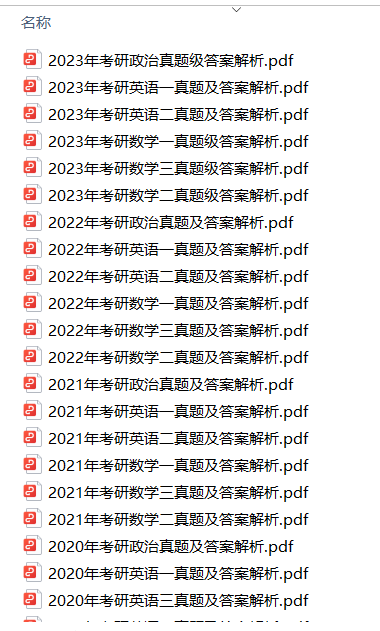 、
、
2.2013-2023年专业课考试历年真题及解析PDF版

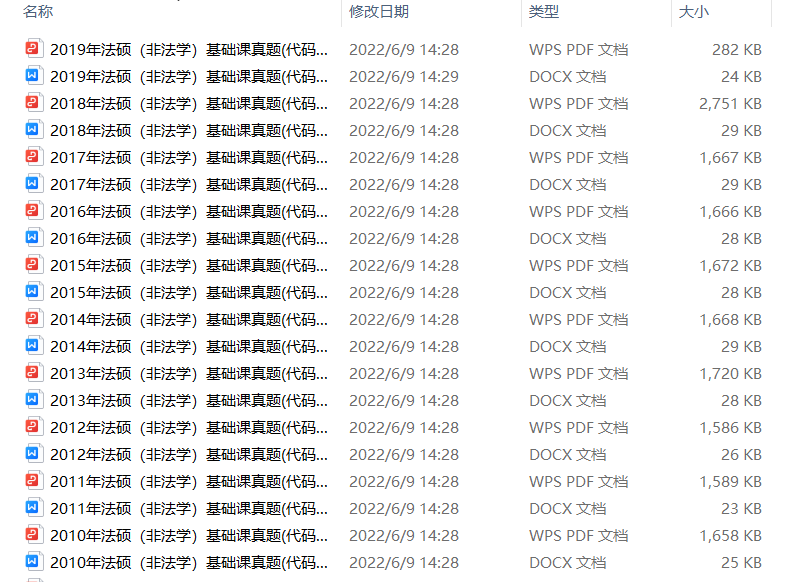
3.24考研复习备考资料大合集
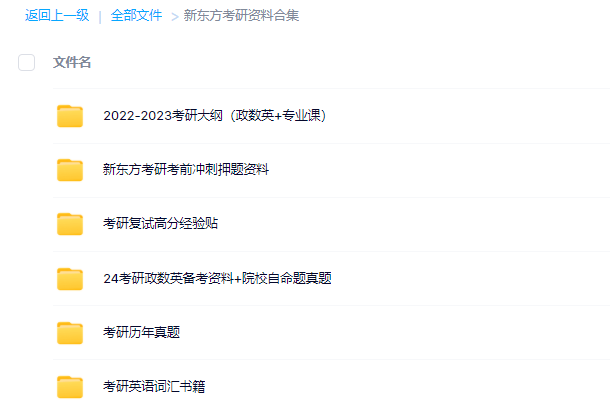
3.24考研复习备考资料:考研大纲
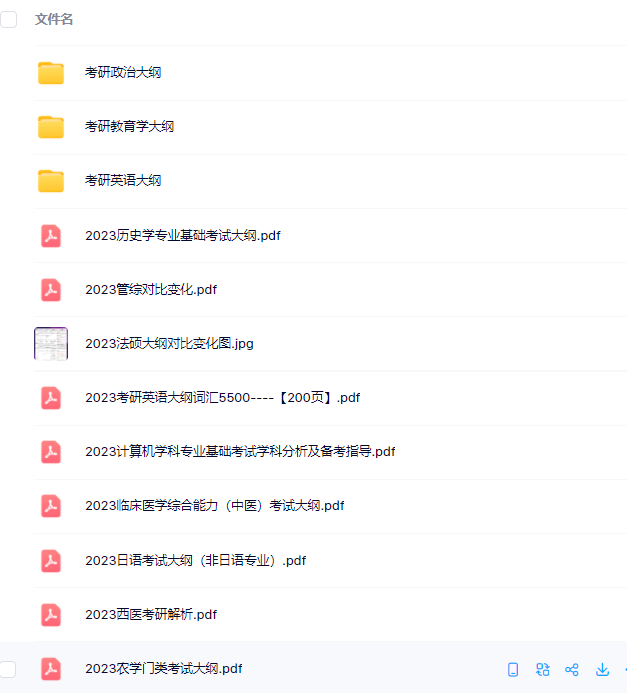
3.24考研复习备考资料:政数英备考资料+自命题真题
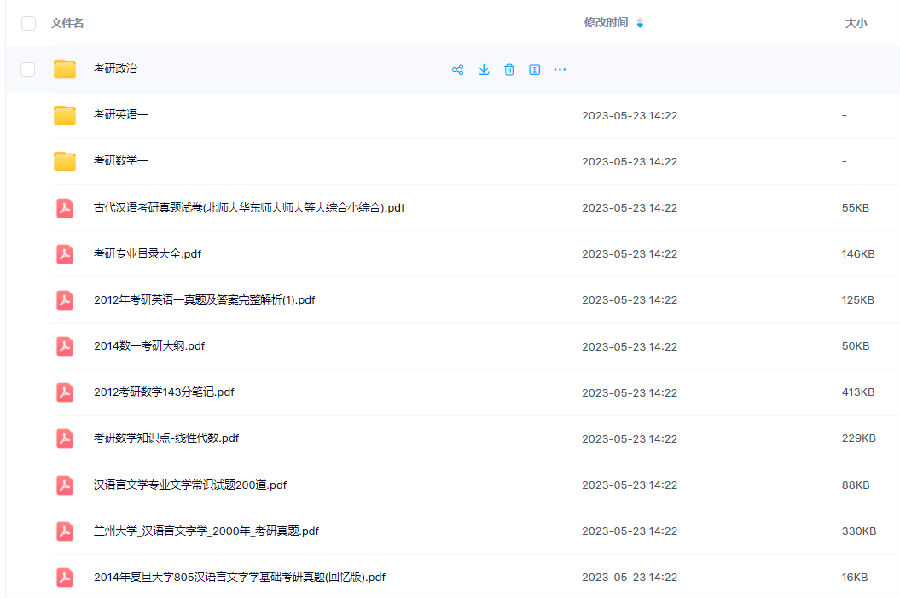
------------------
考研备考过程中,尤其是专业课部分,参考往年的考试真题,对于我们的复习有更好的帮助。北京大学考研真题资料都有哪些?小编为大家进行了汇总。
北京大学考研真题资料-公共课
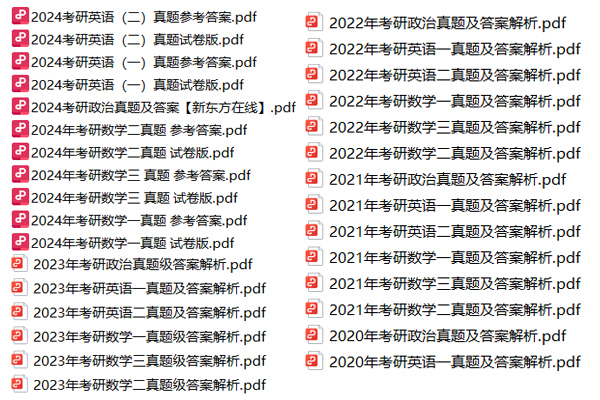
北京大学考研真题资料-专业课


以上就是关于“北京大学考研真题资料下载(历年汇总)”的整理,更多考研资料下载,请关注微信获取下载地址。
2024考研公共课必背知识点汇总
发布时间:2023-01-03扫码添加【考研班主任】
即可领取资料包
2013-2023考研历年真题汇总
发布时间:2023-01-03扫码添加【考研班主任】
即可领取资料包
考研英语大纲词汇(PDF可打印)
发布时间:2023-01-03扫码添加【考研班主任】
即可领取资料包
2024考研专业课知识点总结
发布时间:2023-01-03扫码添加【考研班主任】
即可领取资料包
2023考研政治 内部押题 PDF
发布时间:2022-11-16扫码添加【考研班主任】
即可领取资料包
徐涛:23考研预测六套卷
发布时间:2022-11-16扫码添加【考研班主任】
即可领取资料包
考研政数英冲刺资料最新整理
发布时间:2022-11-16扫码添加【考研班主任】
即可领取资料包
23考研答题卡模板打印版
发布时间:2022-11-16扫码添加【考研班主任】
即可领取资料包
2023考研大纲词汇5500PDF电子版
发布时间:2022-07-28扫码添加【考研班主任】
即可领取资料包
考研历年真题(公共课+专业课)
发布时间:2022-07-28扫码添加【考研班主任】
即可领取资料包
考研英语阅读100篇附解析及答案
发布时间:2022-01-07扫码添加【考研班主任】
即可领取资料包
新东方考研学霸笔记整理(打印版)
发布时间:2022-01-07扫码添加【考研班主任】
即可领取资料包
2001-2021年考研英语真题答案(可打印版)
发布时间:2022-01-07扫码添加【考研班主任】
即可领取资料包
考研英语词汇5500(完整版下载)
发布时间:2022-01-07扫码添加【考研班主任】
即可领取资料包
2022考研政审表模板精选10套
发布时间:2022-01-07扫码添加【考研班主任】
即可领取资料包
历年考研真题及答案 下载
发布时间:2021-12-09扫码添加【考研班主任】
即可领取资料包
考研政审表模板汇总
发布时间:2020-06-17扫码添加【考研班主任】
即可领取资料包
近5年考研英语真题汇总
发布时间:2020-06-17扫码添加【考研班主任】
即可领取资料包
考研英语大纲词汇5500
发布时间:2020-06-17扫码添加【考研班主任】
即可领取资料包
2022考研12大学科专业排名汇总
发布时间:2019-11-21扫码添加【考研班主任】
即可领取资料包
2023考研政治复习备考资料【珍藏版】
发布时间:2019-11-21扫码添加【考研班主任】
即可领取资料包
考研英语万能模板+必备词汇+范文
发布时间:2019-11-21扫码添加【考研班主任】
即可领取资料包
考研数学一、二、三历年真题整理
发布时间:2019-11-21扫码添加【考研班主任】
即可领取资料包

添加班主任领资料
添加考研班主任
免费领取考研历年真题等复习干货资料

 推荐阅读
推荐阅读
真题是非常重要的学习资料,它能更好地帮助我们巩固所学的知识,大家在备考时候要多做一些真题,这样对真题高频考点有所了解,更有目的
来源 : 网络 2025-04-28 07:35:00 关键字 : 考研真题
真题是非常重要的学习资料,它能更好地帮助我们巩固所学的知识,大家在备考时候要多做一些真题,这样对真题高频考点有所了解,更有目的
来源 : 网络 2025-04-28 07:35:00 关键字 : 考研真题
真题是非常重要的学习资料,它能更好地帮助我们巩固所学的知识,大家在备考时候要多做一些真题,这样对真题高频考点有所了解,更有目的
来源 : 网络 2025-04-28 07:35:00 关键字 : 考研真题
真题是非常重要的学习资料,它能更好地帮助我们巩固所学的知识,大家在备考时候要多做一些真题,这样对真题高频考点有所了解,更有目的
来源 : 网络 2025-04-27 07:35:00 关键字 : 考研真题
真题是非常重要的学习资料,它能更好地帮助我们巩固所学的知识,大家在备考时候要多做一些真题,这样对真题高频考点有所了解,更有目的
来源 : 网络 2025-04-27 07:35:00 关键字 : 考研真题

 资料下载
资料下载
扫码添加【考研班主任】
即可领取资料包
扫码添加【考研班主任】
即可领取资料包
扫码添加【考研班主任】
即可领取资料包
扫码添加【考研班主任】
即可领取资料包
扫码添加【考研班主任】
即可领取资料包
扫码添加【考研班主任】
即可领取资料包
新东方在线考研资料合集
下载方式:微信扫码,获取网盘链接

目录:
1.2013-2023年近10年政数英真题及解析PDF版(新东方)
2.2013-2023年专业课考试历年真题及解析PDF版
3.24考研复习备考资料大合集:大纲+备考资料+词汇书+考前押题+自命题
资料介绍:
1.2013-2023年近10年政数英真题及解析PDF版(新东方)
 、
、
2.2013-2023年专业课考试历年真题及解析PDF版


3.24考研复习备考资料大合集

3.24考研复习备考资料:考研大纲

3.24考研复习备考资料:政数英备考资料+自命题真题

------------------
考研备考过程中,尤其是专业课部分,参考往年的考试真题,对于我们的复习有更好的帮助。北京大学考研真题资料都有哪些?小编为大家进行了汇总。
北京大学考研真题资料-公共课

北京大学考研真题资料-专业课


以上就是关于“北京大学考研真题资料下载(历年汇总)”的整理,更多考研资料下载,请关注微信获取下载地址。
扫码添加【考研班主任】
即可领取资料包
扫码添加【考研班主任】
即可领取资料包
扫码添加【考研班主任】
即可领取资料包
扫码添加【考研班主任】
即可领取资料包
扫码添加【考研班主任】
即可领取资料包
扫码添加【考研班主任】
即可领取资料包
扫码添加【考研班主任】
即可领取资料包
扫码添加【考研班主任】
即可领取资料包
扫码添加【考研班主任】
即可领取资料包
扫码添加【考研班主任】
即可领取资料包
扫码添加【考研班主任】
即可领取资料包
扫码添加【考研班主任】
即可领取资料包
扫码添加【考研班主任】
即可领取资料包
扫码添加【考研班主任】
即可领取资料包
扫码添加【考研班主任】
即可领取资料包
扫码添加【考研班主任】
即可领取资料包
扫码添加【考研班主任】
即可领取资料包
扫码添加【考研班主任】
即可领取资料包
扫码添加【考研班主任】
即可领取资料包
扫码添加【考研班主任】
即可领取资料包
扫码添加【考研班主任】
即可领取资料包
扫码添加【考研班主任】
即可领取资料包
扫码添加【考研班主任】
即可领取资料包

 阅读排行榜
阅读排行榜
 相关内容
相关内容